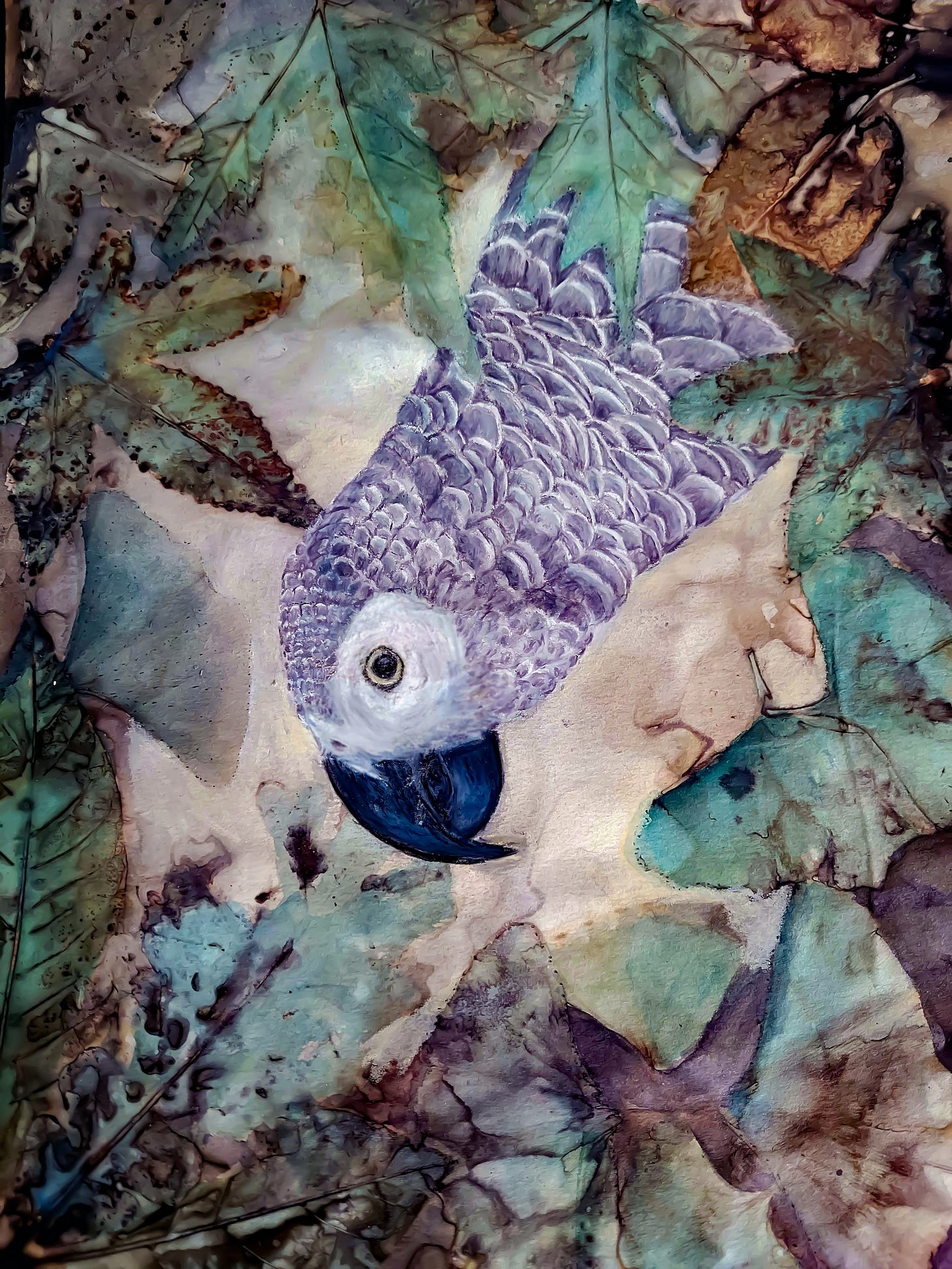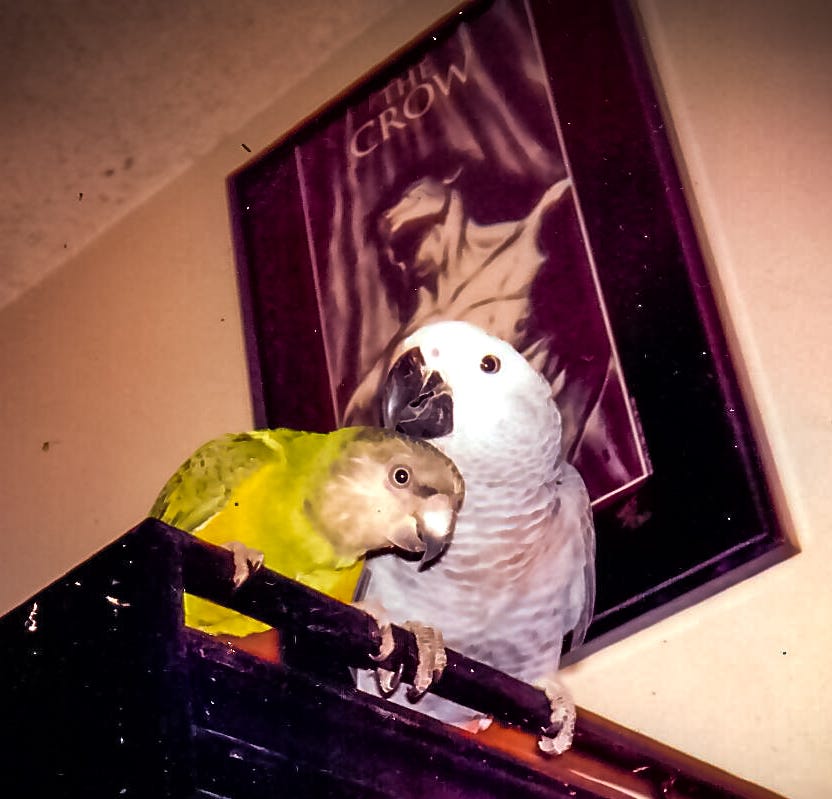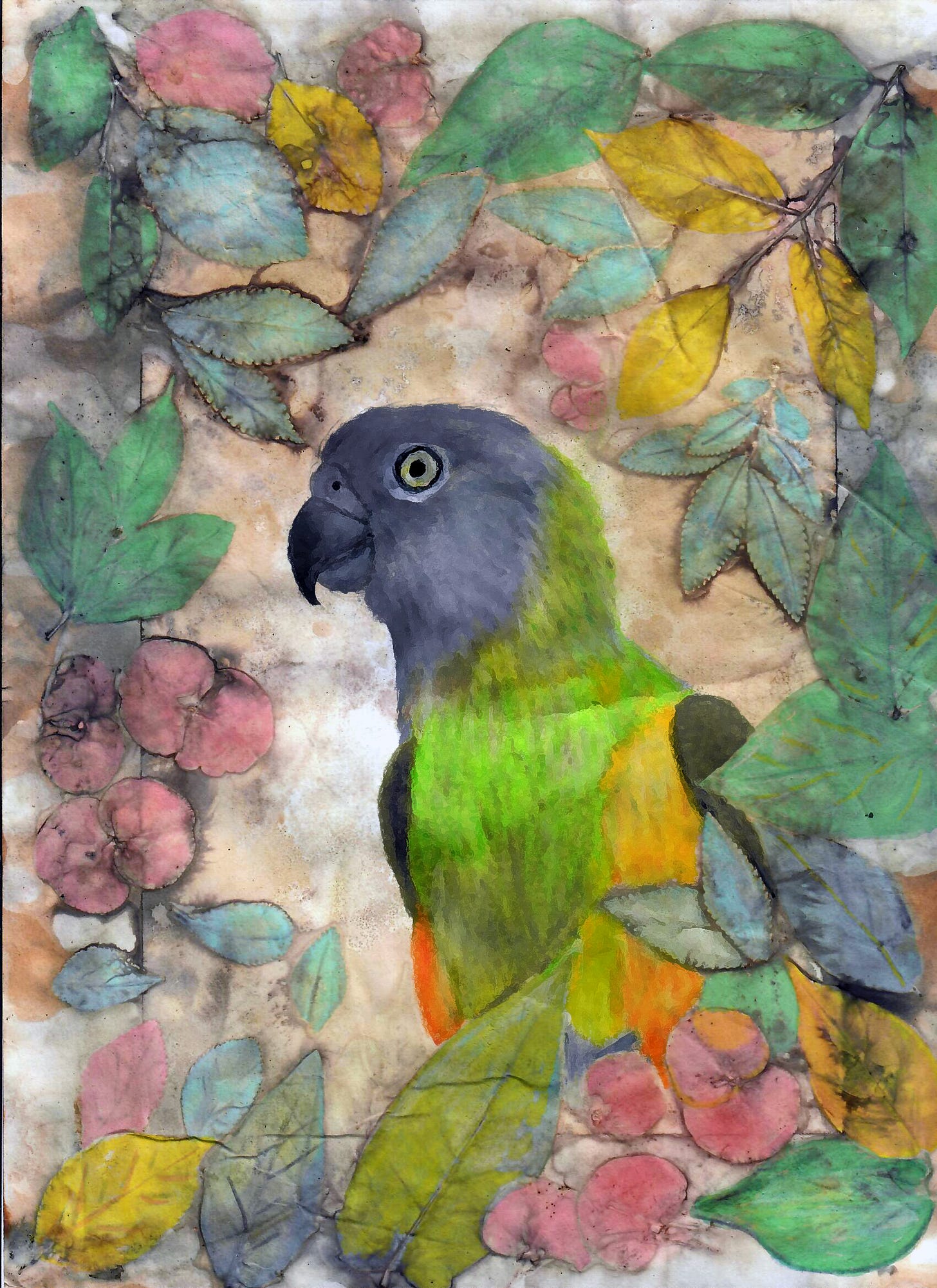The Wild Inside
Indomitable Senegals, snarky grey parrots, and all the wonderful wild sounds
In 1996, I gently cupped a six-week-old African grey parrot in my palms, and then lifted him up to my face. He mumbled happily at me and while I had no idea what he had just said, he may as well have announced that he was coming home with me. Looking back, I’m pretty sure whatever the chick said to me was a snarky insult laced with affection. Once he learned English, this was how Tyrannosaurus Vox (Ty) would communicate with me for the next 28 years. In fact, just this morning he marked my behavior with a “good girl” when I gave him his breakfast bowl. (He’s been listening to me train the new puppy.) He laughed when I gave him a dirty look.
I had bought a Senegal parrot a few months before I got Ty. I thought I couldn’t afford an African grey, but I had picked up a new contract for my attorney services business and the price was only $600 if I handraised him. It was still a lot of money, but suddenly that didn’t matter. Loki was getting a parrot friend and together they would be constants in my life for nearly three decades.
I doubt many parrots have had all the adventures these two have had. A couple years later, I would shut down my attorney services business and move us all to Florida to be a part of the opening team of the bird show at Disney’s Animal Kingdom. They went with me to Ohio to run the summer bird show, to Dallas for the Texas State Fair, and when I went to Australia for six months, Loki lived with a friend and Ty lived on the ranch surrounded an incredible array of birds being trained for shows. My parrots lived in Sacramento, in Palm Desert, in the apartment above my dad’s garage in Redlands, and eventually we all settled in Banning.
I always joked that Loki was too stubborn to learn to speak anything but Senegalese and indeed, she never said a word in human and never imitated another bird. Ty on the other hand has an incredible vocabulary across species. He can do a pitch perfect imitation of white-faced whistling tree ducks, African fish eagles, fish crows, bald eagles, and other species I no longer quite recognize. The other day my Merlin app told me he was imitating a boat-tailed grackle and the fact that I woke up dreaming of Florida made complete sense.
Ty never stops learning either. He imitates (mocks?) the wild fledgling red-tailed hawks begging for food, barks at the dogs, joins in with my Cooper’s hawk, and chups at the falcon. My part in Ty’s soundscape generally involves my laughter which starts normal enough and devolves into maniacal, and hundreds of phrases used at just the right time to evoke a glare from me or if I can’t help myself, more laughter.
Loki was pure devotion, a pocket-parrot that went with me on car rides, snuggled on the couch and flew around our home always in search of my shoulder. She’s probably bitten just about every friend and roommate I’ve ever had, but she never bit me. I adored her.
Senegals have a shorter lifespan than African greys. Few live longer than 30 years. I knew this, but when Loki passed away cradled against my chest last winter, the crashing wild grief and the howls rising from deep in my chest surprised even me. Loki was a witness and a confidant from my mid-twenties into middle age. It seemed impossible that a living being so constant could be gone.
I cradled Loki in one of my favorite t-shirts and showed her to Ty, saying, “good-bye” several times. I didn’t think he would understand, but the grey parrot’s expression was stricken. I buried her in front of my enclosed porch where she could always be near and placed the flattest, most beautiful rock I could find from the San Gorgonio River on top of her grave. Then for a week or so, Ty and I were utterly silent, the soundscape of my house eerily still.
I don’t think we ever stop looking for our dearest pets after their passing. We catch glimpses of them from the corner of our vision, reaching out a hand to touch them before remembering they are gone. Sometimes, even years later, in a reverie, we turn, expecting to see them in a space they loved to occupy and are startled. There is a spike of adrenaline as you realize they are not there and may not be safe. Then you remember and feel their permanent absence anew.
Yet, after our solid week of mourning, as the house regained it soundscape, I realized I didn’t feel like Loki was gone at all. One morning, I was on the phone with a friend, and she said, “Awww. I can hear Loki. Does Ty do that a lot? It must be hard.”
In fact, I started listening and realized that Ty didn’t just call out in Senegal on occasion, he did it consistently and so, Loki was always with us. Our soundscape matters in a way that I never realized. I didn’t have moments of shock that my friend of three decades was gone, because I heard her all the time and I hadn’t even noticed. Could it be that I only ever notice what is missing? What if when I notice, it’s too late?
When I was just a kid in the 70s, I heard about the book Silent Spring by Rachael Carson in school and as I moved into a career in conservation, I grew to understand it as a rallying cry. I had always considered the silencing of birdsong a metaphor for the larger loses, but now I think on Carlson’s “A Fable for Tomorrow” with horror. I don’t think we realize just how much peace and comfort the familiar sounds of nearby nature provide. They surround us and weave through our psyche. Ty has kept Loki with us and that is such a gift, but despite his incredible repertoire, Ty’s voice is not enough to ease the heartbreak of an extinction. What if we never notice until it’s gone?
It's been almost a year now since we lost Loki, and she is still a constant in Ty’s voice. I planted narrow-leaf milkweed around her grave because I thought she would enjoy butterflies. While I had only ever seen one monarch at my house, we fed dozens of caterpillars this year. Thinking she would like bird friends too, there is also now a bird bath, a wildlife pond, and this fall I planted toyon, sage, mallow, native grasses, western redbud, and Encelia. I still want ceanothus, elderberry, and wild grapes. I think Loki is going to have plenty of bird friends with that feast, and that I will have a vibrant soundscape of wild birds. I hope my neighbors hear them too and I hope they will consider planting their own native gardens for the birds.
In fact, I might just teach them all to use the Merlin app so that they can identify each species by sound. Maybe once they know all the singers, they too will want to make sure that none of them are ever missing.






This was a tough read without a handkerchief. Having kept birds for over 50 years, and certainly knowing the feeling when you lose one. I currently have three African greys, only one, Willie, speaks English, but lots of it. Calls the dogs, mimics most of the birds, mimics me blowing my nose :-) so I truly appreciated this essay. Thanks, as always.
First it was Nighthawks. Then several years later it was House Wrens. This year it was Mourning Doves. Silent Spring indeed.